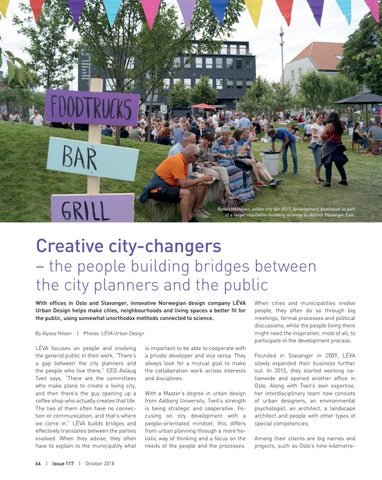Scan Magazine | Special Theme | Nordic Architecture & Design – Norway
Bydelsfestivalen, edible city fair 2017. Arrangement developed as part of a larger reputation-building strategy by district Stavanger East.
Creative city-changers
– the people building bridges between the city planners and the public With offices in Oslo and Stavanger, innovative Norwegian design company LÉVA Urban Design helps make cities, neighbourhoods and living spaces a better fit for the public, using somewhat unorthodox methods connected to science. By Alyssa Nilsen | Photos: LÉVA Urban Design
LÉVA focuses on people and involving the general public in their work. “There’s a gap between the city planners and the people who live there,” CEO Aslaug Tveit says. “There are the committees who make plans to create a living city, and then there’s the guy opening up a coffee shop who actually creates that life. The two of them often have no connection or communication, and that’s where we come in.” LÉVA builds bridges and effectively translates between the parties involved. When they advise, they often have to explain to the municipality what 66 | Issue 117 | October 2018
is important to be able to cooperate with a private developer and vice versa. They always look for a mutual goal to make the collaboration work across interests and disciplines. With a Master’s degree in urban design from Aalborg University, Tveit’s strength is being strategic and cooperative. Focusing on city development with a people-orientated mindset, this differs from urban planning through a more holistic way of thinking and a focus on the needs of the people and the processes.
When cities and municipalities involve people, they often do so through big meetings, formal processes and political discussions, while the people living there might need the inspiration, most of all, to participate in the development process. Founded in Stavanger in 2009, LÉVA slowly expanded their business further out. In 2015, they started working nationwide and opened another office in Oslo. Along with Tveit’s own expertise, her interdisciplinary team now consists of urban designers, an environmental psychologist, an architect, a landscape architect and people with other types of special competencies. Among their clients are big names and projects, such as Oslo’s nine-kilometre-
